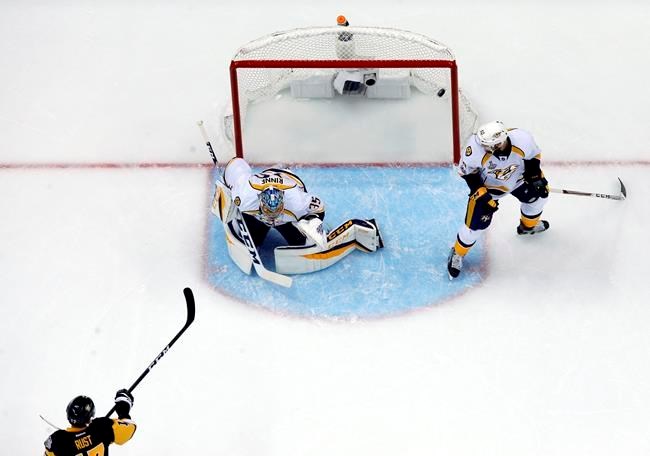PITTSBURGH — Matt Murray is up again, and Pekka Rinne is down.
The Stanley Cup final has been a roller-coaster ride that way for the series' two starting goaltenders. Pittsburgh's Murray regained the upper hand in Game 5 on Thursday night, pitching a 24-save shutout while equalling Tom Barrasso for the most Stanley Cup final wins (seven) in Penguins history.
Nashville's Rinne was pulled after only 20 minutes, meanwhile, in another shaky outing in Pittsburgh — one that saw him surrender three goals on only nine shots.
"There's things we can do better in front of him," Predators head coach Peter Laviolette said after the 6-0 thrashing, which pushed the Penguins to within one win of back-to-back Stanley Cups. "I don't think that necessarily they were bad goals."
Some were the result of breakdowns in the wake of Sidney Crosby's brilliance, others rediscovered pop from Phil Kessel and Evgeni Malkin. But regardless, it's difficult to ignore just how many goals have found their way past the 34-year-old in the three games at PPG Paints Arena: 11 on just 45 shots for a .756 save percentage.
Rinne performed superbly in two wins at home in Nashville, stopping 50-of-52 shots. He was especially locked in during Game 4 when the Penguins dialled up their attack.
An eighth round pick of the Preds way back in 2004, Rinne has been excellent at home throughout the playoffs with a 9-1 record and .949 save percentage. He's not been anywhere near as effective on the road with a 5-6 mark and .905 save percentage.
Laviolette continued his steadfast support of the Finn, who was spectacular in the first three rounds and the primary reason for the club's advancement to a first Stanley Cup final.
Without a return to form at home, though, and a follow-up performance on the road in a potential Game 7, the Predators season will likely come to an end.
Much as Laviolette faced questions about Rinne after his early series struggles, so too did Penguins head coach Mike Sullivan with regard to Murray after Game 4. Sullivan's confidence in the 23-year-old has rarely wavered, and Murray justified that belief on Thursday night.
Though the Pens raced out to a 3-0 first period lead, Murray was sharp as the Preds tried to mount an early comeback. There were two strong back-to-back stops, in particular, on James Neal shortly after Bryan Rust scored the second Pittsburgh goal.
"Matt, I think, understands his game and how he needs to play in order to help this team win, and he believes in himself and we believe in him," Sullivan said. "He made a handful tonight that we needed, and we believe he'll do that. That's what he's done since he's been a Penguin."
In his short NHL career, which began with a Cup win as the unlikely Penguins starter last spring, Murray has demonstrated an ability to rebound from poor performances. He's 8-1 in the post-season after a loss.
The Thunder Bay, Ont., native had been rocked for eight goals in the two defeats in Nashville, though Murray himself wasn't too displeased with his overall performance. He described Game 3 (five goals on 33 shots) as "OK" and Game 4 (three goals on 25 shots) as "pretty good" outside of the breakaway goal from Viktor Arvidsson which gave the Predators a 3-1 lead.
Murray was on the ice early for practice on Wednesday afternoon, working through an array of standard drills — some puck-handling, some shots from in tight — alongside Marc-Andre Fleury and goalie coach Mike Bales.
His primary goal to playing well, he said afterward, was "finding pucks through traffic." He was unconcerned with noise on the outside with regard to Fleury potentially regaining the reigns.
"It's not really something I think about at all, to be honest," said Murray, who took over for Fleury midway through the Eastern Conference final. "What people are going to say is what people are going to say. I have no control over that."
That, more broadly, is how Murray describes his ability to cooly handle the spotlight — "just worry about doing my job and trying to give the team the best chance to win."
Jonas Siegel, The Canadian Press
